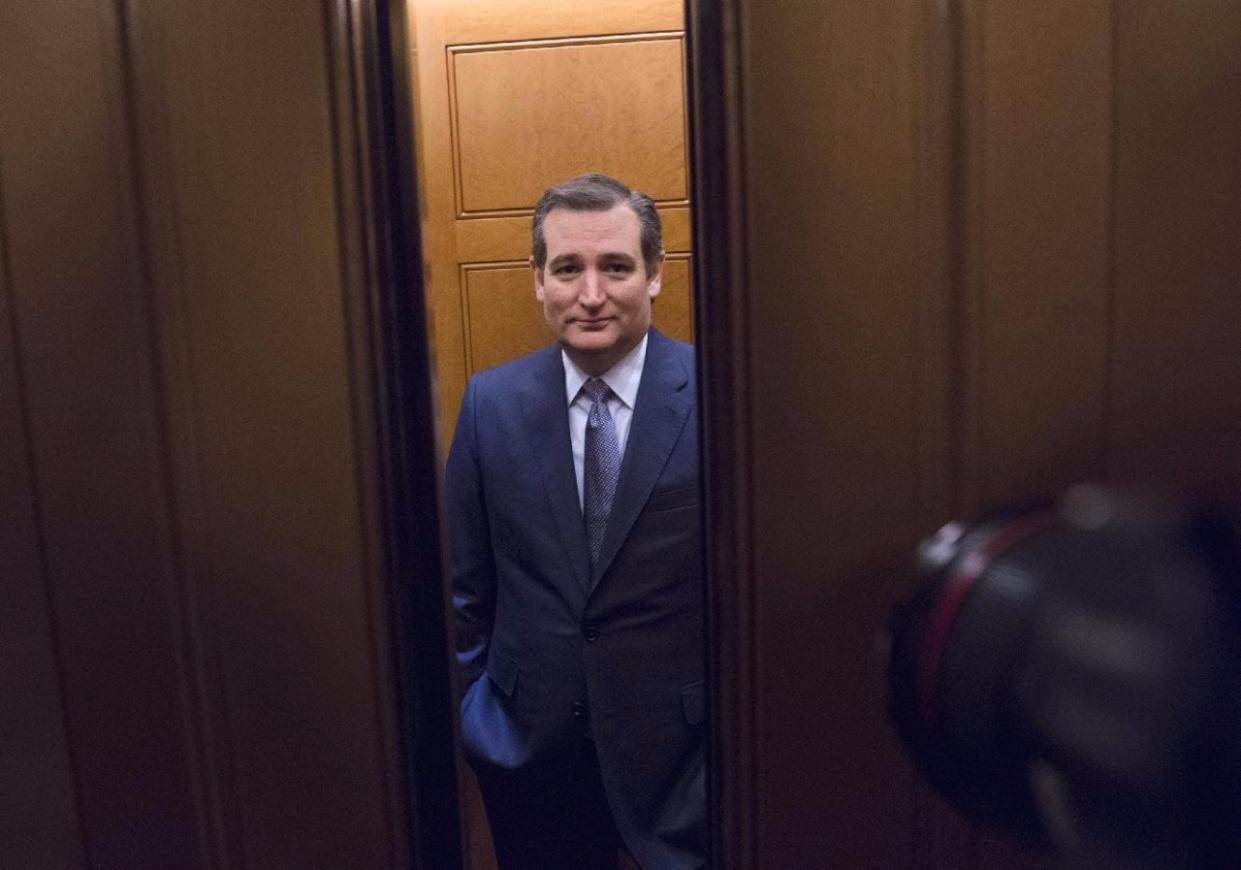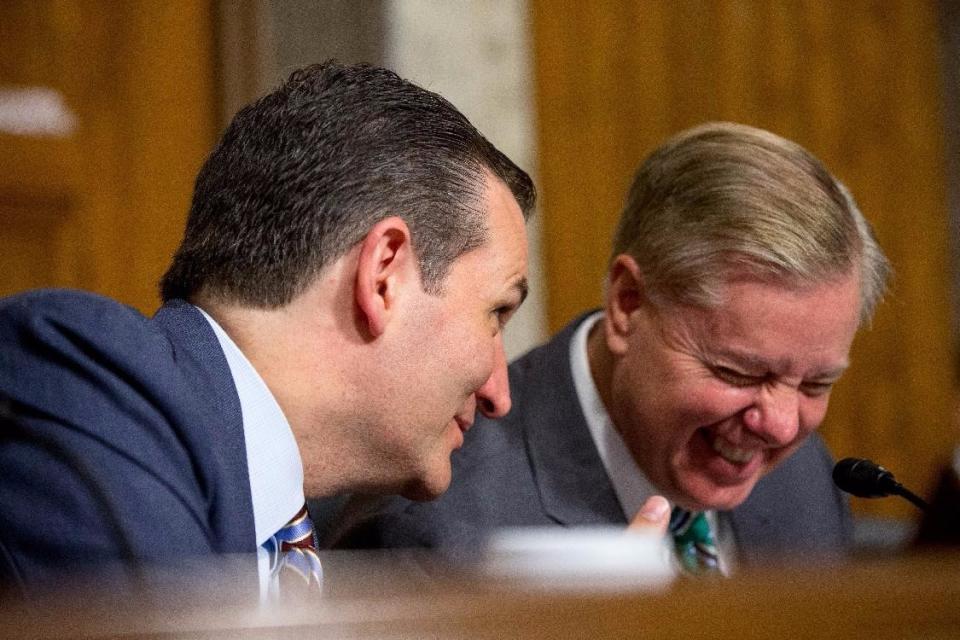Ted Cruz’s biggest challenge yet is making nice with his Senate colleagues

Photo: Molly Riley/AP
Republican senators’ least favorite Washington politician is not Hillary Clinton. It’s not Chuck Schumer or President Obama. It is Sen. Ted Cruz.
Senate Republicans revile Cruz with special fervor because of their sense that he has used his short time in the Senate primarily to engage in political stunts and mock them as corrupt imbeciles in order to promote himself.
The insults sting all the more because they have worked. With Florida Sen. Marco Rubio now out of the presidential race and Ohio Gov. John Kasich unable to capture the GOP nomination outright, Senate Republicans face what South Carolina’s Lindsey Graham has described as a choice between being shot or poisoned in a two-way fight between Cruz and Donald Trump.
Eager to consolidate support, Cruz is offering his version of an olive branch, asking select Senate colleagues to unite behind him through the rest of the GOP primary fight.
At the same time, Senate Republicans’ dislike of Cruz runs so deep that many plan to sit on their hands in the coming months and await a nominee. In more than 20 interviews and conversations over the past week, Republican senators and staffers described deep antipathy toward Cruz.
“Now is the time for Republicans to unite for all of us who want a brighter future for our nation to come together and stand as one,” Cruz said Tuesday night, urging Rubio supporters and others to join him against Trump.
Cruz recently began calling Senate Republican colleagues “with a pitch for party unity against Donald Trump,” said Josh Holmes, a former top aide to Senate Majority Leader Mitch McConnell of Kentucky.
McConnell is not among those Cruz has called, said Holmes, who is president and a founder of Cavalry LLC, which provides political consulting to Senate campaigns and others.
Graham did receive a call from Cruz after musing publicly about backing him over Trump. The Texas senator emphasized areas of agreement, according to Graham, including the suggestion that “he will be a more reliable supporter of Israel than Donald will.”
Cruz’s fellow Texan, Sen. John Cornyn, the second-ranking Senate Republican, said last week that his suggestion that Cruz “engage with members of the Republican conference” drew interest from Cruz.
“The relationship could use some improvement,” Cornyn added.
Oklahoma Sen. Jim Inhofe, who endorsed Rubio, said that he doubts Cruz can convince senators who haven’t backed him yet to change course before the convention.
“I’m not sure what he could do that he couldn’t have been doing all along,” Inhofe said. “There are a lot of negative feelings.”
In a possible signal to establishment Republicans that he wants their help, Cruz said on Monday that he “could absolutely see a place for” Rubio and Kasich in his Cabinet if elected to the White House.
Cruz’s campaign is currently working to line up support from pledged delegates in anticipation of a potential convention fight in which many delegates could switch to support him after the first ballot. The odds of pulling off such an upset are already low, and Cruz could surely use help from Republican senators who might influence delegates from their states.
But Cruz’s outreach has so far borne little fruit. A Cruz endorsement last Thursday by Utah Republican Mike Lee, probably the Texan’s staunchest Senate ally, was notable primarily for how late it came.
“He’s a uniquely flawed messenger for a unity pitch given his proclivity to throw Republicans under the bus every time he’s had an opportunity to improve his own standing,” Holmes said. “Almost any other candidate in the field would be able to bring the party together behind their candidacy at this point. But everyone else might need to be eliminated before that happens [for Cruz].”
Cruz’s role in forcing the 2013 government shutdown is only the most prominent on a long list of grievances Senate Republicans have compiled against the Texas senator since his 2012 election. His support for the Senate Conservatives Fund, a political action committee that often endorses conservative challengers bidding to oust Senate Republican incumbents, has left lasting anger.
And so the idea that Cruz would be a preferable nominee to Trump is not a given for many Republicans. Alabama’s Jeff Sessions, the only senator to have endorsed Trump, is hardly the only GOP senator unsold on Cruz.
“It’s a real open question whether people ultimately conclude Ted Cruz is any more palatable than Donald Trump,” said Holmes. “Conservatives certainly think Ted Cruz is ideologically more predictable than Donald Trump. But he has less experience than anyone in the field and is more personally disliked than any candidate in modern history.”

Sen. Lindsey Graham, seen laughing with Cruz at a Senate Armed Services Committee hearing in July 2015, is among the GOP colleagues Cruz has reached out to. (Photo: Andrew Harnik/AP)
Senators say Cruz should get to work if he hopes to improve his Senate relations.
“Show some interest,” said Utah Sen. Orrin Hatch, the longest serving Senate Republican, when asked how Cruz could win colleagues’ support. “Quit running down the Congress as though we’re a bunch of imbeciles.”
Kansas Sen. Pat Roberts cited Neil Diamond’s “Sweet Caroline” as instructive. “How’s it go?” Roberts said. “Hands, touching hands. Reaching out…”
“I am sure there will be people who will start moving in his direction,” said South Dakota’s John Thune, who heads the Senate Republican Conference. “But in terms of the relationship up here, he certainly can improve his outreach.”
But while Cruz can try to reduce animosity among colleagues, he is unlikely to seek or receive many endorsements as he takes on Trump, senators and aides said.
Cruz, who has worked in federal and state politics for most of the past 16 years, still hopes to cast himself as a more legitimate Washington outsider than Trump, who has never held any office. “Donald Trump is the system,” Cruz said Sunday. “He is Washington.”
Cruz often cites his lack of support from GOP senators as evidence of his refusal to trade conservative values for Beltway popularity, and he has suggested that lawmakers who dislike him are part of the “Washington cartel” he is fighting.
That rhetoric gives Cruz a pitch he can hardly swap now for the blessing of the alleged “cartel” bosses.
“I am not sure that so-called establishment help is what he wants,” Thune said.
That view was borne out Wednesday when Cruz seemed to reject a suggestion, first reported by CNN, that he apologize to McConnell for calling the senior Republican a liar in remarks on the Senate floor last year.
Cruz told Fox News he will not “come on bended knee, with my hat in hand and suddenly say, ‘Oh, all the Washington politicians were right.’
“I’m gonna continue standing up to Washington, to the bipartisan corruption that got us in this mess,” Cruz said.
Ultimately, lawmakers planning to help or simply not oppose Cruz suggested their approach results mostly from a dispassionate decision to try to stop Trump and the electoral catastrophe they fear will result from his nomination. Cruz, rarely seen in the Senate these days as he campaigns, just needs to stay out of the way.
Even so, Republican lawmakers and aides believe Cruz will experience no big wave of support from fellow senators unless he first captures the Republican nomination.
North Carolina Sen. Richard Burr, who in January denied an Associated Press report that he told campaign donors he would vote for Vermont Sen. Bernie Sanders before Cruz, said there is only one way for Cruz to win Senate GOP support.
“Win the nomination,” Burr said. “At the end of the day, we’re going to be supportive of our nominee.”
Many GOP senators said they welcome Cruz’s seeking their support. But the likely result may be subtle.
“It affects the enthusiasm with which you’ll back him, certainly, or statements you’ll make,” said Arizona Republican Jeff Flake. “It never hurts.”
Hatch said he hopes to hear from Cruz soon.
“We all make mistakes. We all have to change some things, You’ve got to allow room for the younger people who are new to the process to make mistakes,” Hatch said. “Ted’s learning a lot from this. It’s been good for him.”

